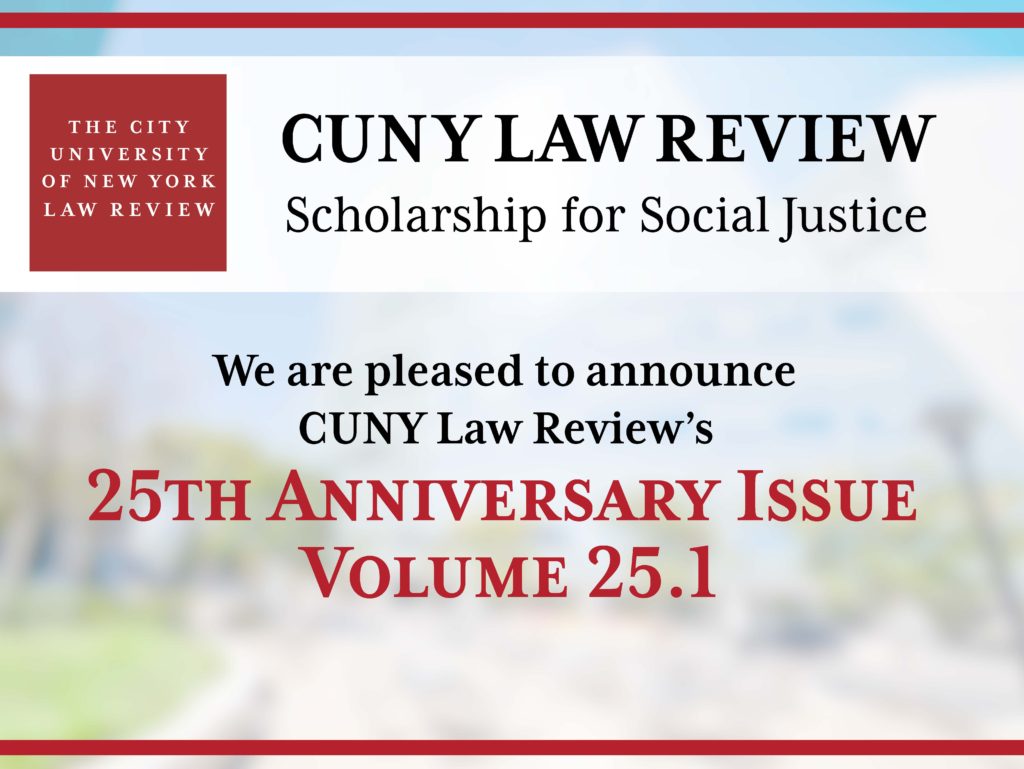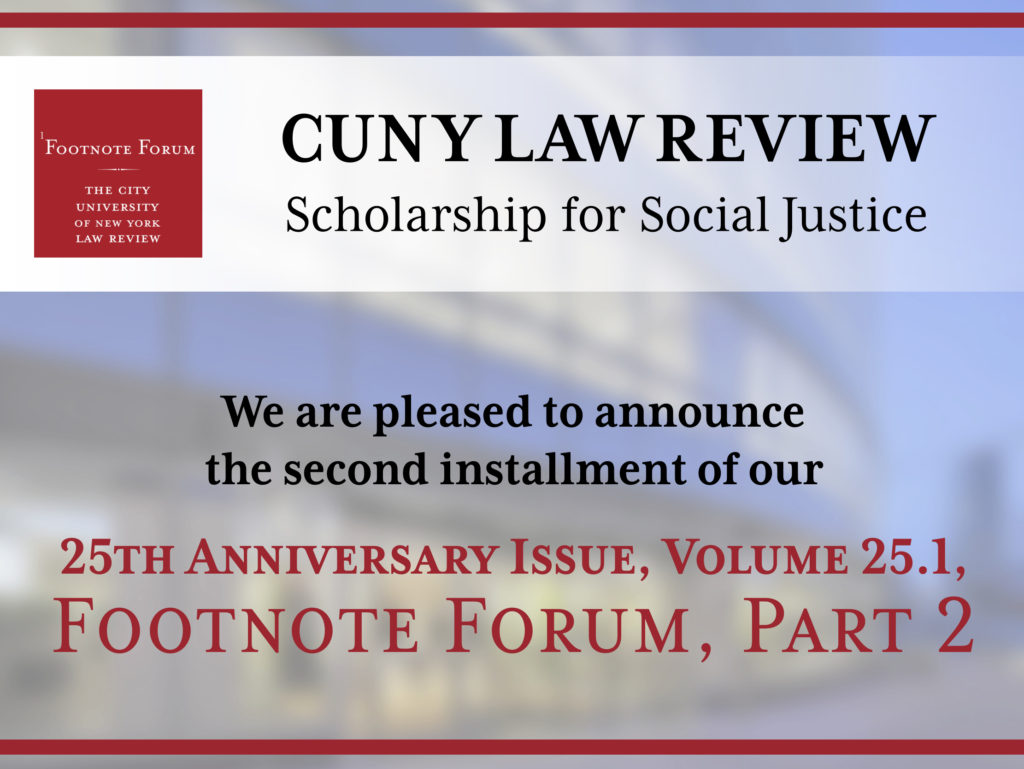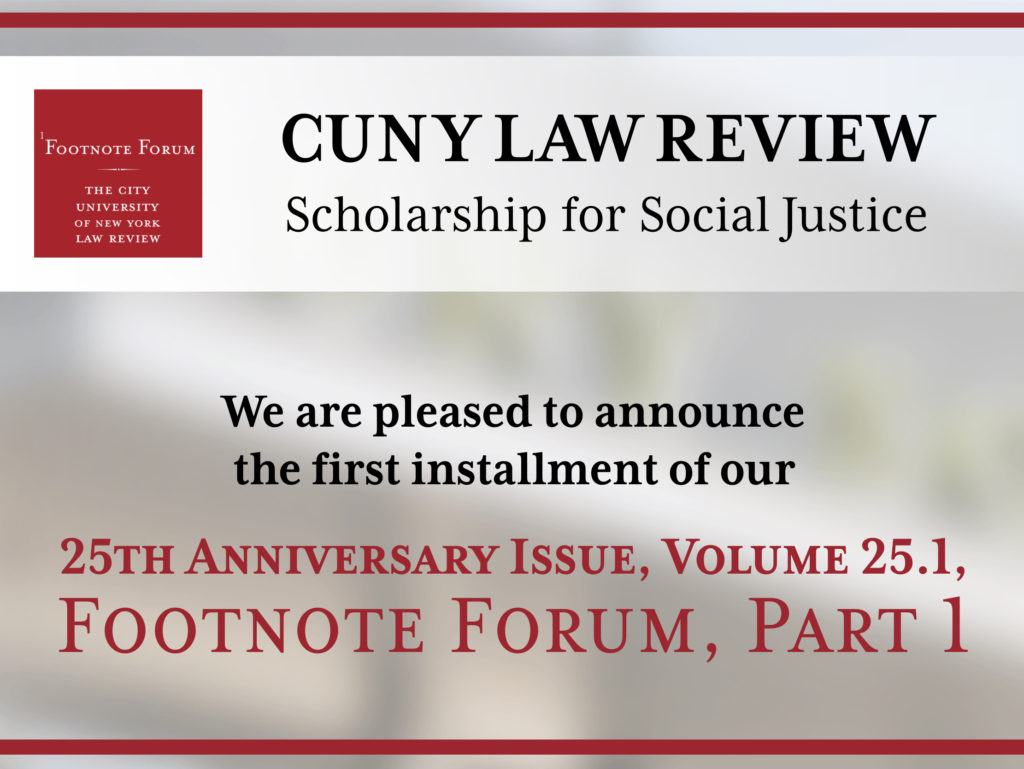“Inherently Expressive”: BDS Organizing for Palestinian Liberation at CUNY School of Law and Beyond by Students for Justice in Palestine (SJP) and the Jewish Law Students Association (JLSA), City University of New York (CUNY) School of Law
BDS-Organizing-for-Palestinian-Liberation-at-CUNY-School-of-Law-and-Beyond-26-CUNY-L.-Rev.-67-2023Category Archives: Footnote Forum
Volume 26.1, Footnote Forum
The Domestic Violence Survivors Justice Act and Criminalized Immigrant Survivors by Assia Serrano & Nathan Yaffe
Abstract
This piece explores how New York’s Domestic Violence Survivors Justice Act (“DVSJA”), a law meant to grant freedom to criminalized survivors, plays out in practice for criminalized immigrant survivors. New York enacted the DVSJA to address the unjust, but common, harsh punishment of survivors for conduct that an abuser compels, coerces, or otherwise causes. When the court grants a survivor DVSJA relief, the material benefit is shortening that survivor’s sentence of incarceration.
However, for criminalized immigrant survivors, the DVSJA’s promise of freedom may amount to little more than a mirage because DVSJA relief does not expunge, vacate, or alter underlying convictions. We situate the DVSJA in its institutional, legal, and policy context: a criminalized survivor’s sentence does not exist in a vacuum. Their sentence is just one part of a broader process of criminalization. This piece fills the gap in the policy discussion, based on the experiences of the first immigrant survivor who was resentenced and released under the DVSJA. In addition to calls for changes in policy and practice, this piece urges New York Governor Kathy Hochul, who has expressed concern for the plight of domestic violence survivors—but largely has not used her clemency power to free criminalized survivors (whether facing deportation or not)—to live up to her stated values through widespread use of the clemency power.
Assia-Serrano-Nathan-Yaffe-The-Domestic-Violence-Survivors-Justice-Act-and-Criminalized-Immigrant-Survivors-26-CUNY-L.-Rev.-F.-24-2023Volume 26.1, Footnote Forum
Volume 25.1 – CUNY Law Review 25th Anniversary Issue

We are excited to announce the publication of the 25th Anniversary Volume of CUNY Law Review, Volume 25.1! The full journal is available at CUNY Academic Works. Please see below for individual articles:
Articles
Restorative Justice in Cases of Sexual Harm
Alexa Sardina and Alissa R. Ackerman
Supreme Confusion About Causality at the Supreme Court
Issa Kohler-Hausmann and Robin Dembroff
Notes
Challenging Weapons Deals Between the United States and Israel: Limitations and Prospects
Ryan J. McNamara
Comments
Casting Out from the Inside: Abolishing Felony Disenfranchisement in New York
Elizabeth Neuland
Public Interest Practitioner Section
Elderly, Detained, and Justice-Involved: The Most Incarcerated Generation
Rachael Bedard, Joshua Vaughn, and Angela Silletti Murolo
Footnote Forum
The Impeachment Trials of Donald John Trump: How Senate Jurors Strengthened the Case Against Federal Felon-Juror Exclusion
James M. Binnall
Footnote Forum Podcast
Challenging Reform: A Formerly Incarcerated Student Roundtable Discussion
Colby Williams, Phil Miller, and Jordan Sudol
Listen to the audio recording here
Volume 25.1, Footnote Forum, Part 2

We are pleased to publish Volume 25.1, Footnote Forum, Part 2!
In this installment, we present articles written by two currently incarcerated authors who speak to us from their personal experiences. In The Correctional Institute of Nothing, Frank Pruitt writes about his desire for more holistic treatment opportunities in prison, the lack of which he has witnessed for 30 years. Next, in Why Reforms Are not Enough: Justice and Accountability Reimagined, Felix Sitthivong details how abolitionist ideals are vital to many incarcerated people and how reforms fall short of those ideals.
Footnote Forum will publish Part 3 in February 2022. For Part 1, please click here. The full journal is available at CUNY Academic Works. Please see below for individual articles:
The Correctional Institute of Nothing by Frank Pruitt
Q&A with Frank Pruitt by Frank Pruitt
Why Reforms are Not Enough: Justice and Accountability Reimagined by Felix Sitthivong
Q&A with Felix Sitthivong by Felix Sitthivong
Volume 25.1, Footnote Forum, Part 1

We are excited to publish Volume 25.1, Footnote Forum, Part 1. This installment features David Campbell, a former political prisoner, who discusses what “defunding the police” and “reinvesting in communities” could mean if reinvestment took the form of paying incarcerated workers suitable wages. Professor Steve Zeidman, Director of the Defenders Clinic at CUNY School of Law, writes on the notion of whether prosecutors can actually be progressive.
Footnote Forum exists to challenge our assumptions about legal scholarship. For Volume 25.1, we invite readers to consider the value of lived experiences. What can the lives of those directly impacted by the criminal legal system teach us, especially when they have no access to databases normally used for legal research? Does this perspective provide a fuller understanding of the law, and is that valuable for scholarship?
– Natasha Bynum and Colby Williams, Footnote Forum Editors
Footnote Forum is publishing Parts 2 and 3 in December 2021 and February 2022. The full journal is available at CUNY Academic Works. Please see below for individual articles:
Footnote Forum, Part 1
Editors’ Note by Natasha Bynum and Colby Williams
Virtuous Prosecutors? by Steven Zeidman
Decarceration Means Funding the Incarcerated by David Campbell
Q&A with David Campbell by David Campbell
CORONAVIRUS AID, RELIEF, AND ECONOMIC SECURITY FOR WHOM? IRS OVERREACHES IN DENYING CARES ACT ECONOMIC IMPACT PAYMENTS TO MIGRANT WORKERS AND INCARCERATED INDIVIDUALS
CORONAVIRUS AID, RELIEF, AND ECONOMIC SECURITY FOR WHOM? IRS OVERREACHES IN DENYING CARES ACT ECONOMIC IMPACT PAYMENTS TO MIGRANT WORKERS AND INCARCERATED INDIVIDUALS
By: Justin Schwegel†
INTRODUCTION
Individuals who received advance refunds under the Coronavirus Aid, Relief, and Economic Security (CARES) Act met the eligibility criteria in their 2019 tax filings (or 2018 filings if they had not yet filed 2019 taxes).[1] Advance refunds are treated as a refund of an overpayment of 2018 or 2019 taxes.[2] Subsequent changes in tax filing status in 2020 do not retroactively make one ineligible for an advance refund.[3] On May 6, the IRS issued guidance on its Economic Impact Payment Information Center website instructing incarcerated individuals and certain resident aliens[4]that they should return the economic impact payments (also called advance refunds or stimulus payments) they received from the IRS.[5] This guidance is not legally binding for two distinct reasons. First, it was issued without conforming to the procedural requirements of the Administrative Procedure Act. Second, the guidance exceeded the IRS’s rulemaking authority because it contradicts unambiguous statutory language.
Dilley Delegation Staff Interview
Footnote Forum Podcast, a CUNY Law Review Production
Recommended Citation: Footnote Forum Podcast, Interview with Dilley Delegation Staff, 23 CUNY L. Rev. F. 40 (2020)
Click here to view a pdf version of this article
INTERVIEW WITH DILLEY DELEGATION STAFF
Part I
Reena Novotnak: You’re listening to Footnote Forum, a production of the law review at City University of New York School of Law. I’m your editor and host, Reena Novotnak, and I’m joined by our guests, two CUNY Law students.
Joanna Lopez: My name is Jo Lopez, I’m a 3L in the full-time program.
Jacklyn Mann: Hi everyone, I’m Jackie Mann, I’m also a 3L here.
Reena Novotnak: This year, on the podcast, we focused on the Freedom of Information Act and Freedom of Information Law, or FOIA and FOIL. Jo and Jackie joined us to talk about their experience with the Dilley Delegation, and the challenges and lack of transparency they faced when preparing their clients for asylum hearings. Right now, you’re listening to part one of two of this interview. In this episode, you’ll also hear the voices of two law review staffers: Maya Kouassi and Cesar Ruiz. But it’s Jo here who’ll start us off.
Joanna Lopez: The Dilley delegation was a year-long effort initiated by three students to bring together other CUNY Law students and law professors to be able to provide much-needed on-the-ground work in Dilley, Texas.[1] In a nutshell, we spent a week at the South Texas Family Residential Center and assisted mothers and their children as they prepared for their credible fear interviews. So, much of the work that was done that week was spending 12 to 14-hour days at the detention center and working with women, and listening to their stories, and finding a way to structure their experiences in a way that was palatable to an asylum officer so that they would receive a positive interview and move forward in the asylum process, and also be released from detention, which is a really crucial part of the work that we were doing.
Dilley FOIA Request
CUNY SCHOOL OF LAW DILLEY DELEGATION
FOIA REQUEST
Recommended Citation: CUNY Dilley Delegation, FOIA Request, 23 CUNY L. Rev. F. 70 (2020)
Click here to view a pdf version of this article
TO: U.S. Citizenship & Immigration Services
National Records Center, FOIA/PA Office
P. O. Box 648010
Lee’s Summit, MO 64064-8010
FOIA Officer/Public Liaison: Jill Eggleston
Phone: 1-800-375-5283 (USCIS Contact Center)
Fax: 816-350-5785
E-mail: uscis.foia@uscis.dhs.gov
RE: FOIA REQUEST
Dear Ms. Eggleston,
This is a request under the Freedom of Information Act. We ask to be provided with all guidance and policy on providing notice for credible fear interviews for defensive asylum applicants in federal detention.
I. Introduction
Fear is at the heart of an application for asylum.[1] Some asylum seekers fear abusive spouses, others fear ruthless gangs or interfaith violence.[2] Whatever the reason, that fear creates a moral imperative for the United States to give shelter, and it creates a defense enshrined in federal law.[3] Credible fear interviews (“CFI”) represent the first threshold towards asylum.[4]
Advocates on the ground report that immigrants in detention receive little to no notice for these interviews, which is a potential violation of the Fifth Amendment.[5] Without proper notice, asylum applicants cannot prepare to discuss what are often the most traumatizing moments of their lives. Therefore, we would like to know what federal policies exist for providing notice regarding CFIs, and what, if any, guidance exists for implementing that notice.
Traumatized to Death: The Cumulative Effects of Serial Parole Denials
Content warning: discussion of suicide.
If you are thinking about suicide, please call the National Suicide Prevention Lifeline at 800-273-TALK (8255).
Recommended Citation: Richard Rivera, Traumatized to Death: The Cumulative Effects of Serial Parole Denials, 23 CUNY L. Rev. F. 25 (2020)
Authored By: Richard Rivera
INTRODUCTION
On August 3, 2016, after forty years of continuous incarceration, seventy-year-old John MacKenzie was locked in his cell for the night and killed himself.[1] He was not discovered until the next morning. A month earlier, John had made his tenth and final appearance before the New York State Board of Parole and was denied release to parole for the tenth consecutive time.[2] Rumors about why John decided to end his life abound among prisoners, especially among those who knew him. “He was killed by the CO’s,” many claimed, subscribing to ready-made narratives about correction officers fed, in large part, by their own fears and apprehensions about all things prison. “He made a pact with himself not to do a day over forty years,” the long-termers[3] asserted,[4] zeroing in on the existential crisis that might drive a man like John to suicide. Whatever speculations surround John’s death, his repeated encounters with the Board of Parole certainly factored into his decision to end it. In a final letter to his daughter, John put it this way: “They’re hell-bent on keeping me in prison,” and “I don’t believe I’ll last much longer.”[5]
Continue reading